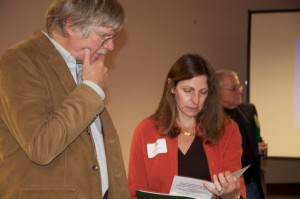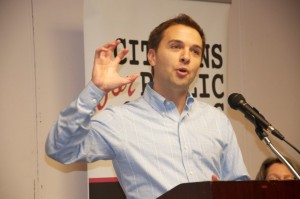By Lisa Guisbond
Citizens for Public Schools’ 2011 Fall Issues Conference drew old and many new members and friends for a high-energy, productive day of sharing ideas for action to protect and improve our schools. The conference united parents, teachers, students and others to discuss challenges like Stand for Children’s teacher evaluation ballot question, charter school financing, high-stakes testing, and resisting Boston school closings.
Boston Teachers Union President Richard Stutman welcomed the crowd, noting that the threats to public education are large, but we have great assets. “Thankfully, there is a Side One, good caring people who don’t want to turn over schools to the Bill Gates and Paul Grogans of the world. Our job to turn things around, educate people, the legislature about corporate influence. To do this we draw on our great assets: teachers, parents, and students working to keep alive public education for all.”
CPS President Paula Parnagian asked for a show of hands to see who was in the room. We learned that about half of us had participated in a CPS conference before and half were new. We had parents, educators, union members and folks from across the state. “I love the diversity,” Parnagian said.
Past CPS President Ruth Rodriguez Fay then shared some opening comments about the failures of the federal No Child Left Behind law to address educational inequities. Unfortunately, new policies from the Obama administration perpetuate the failures of NCLB, such as Secretary of Education Arne Duncan’s Race to the Top program, which “only serve to increase the pervasive actions by many districts for more test prepping and in extreme cases for cheating by administrators fearful of losing the funding, and/or of having their school closed by the state.”

School committee members Roger Garberg and Kathy Clancy came from Gloucester to share their knowledge of the challenges facing the town's schools and school committee.
The morning panel was moderated by Medford School Committee member Sharon Guzik, who described how she got involved at the local level and gradually learned more and more about how what goes on at state and national levels affects the local level and how MCAS affects curriculum. Speakers included City Councillor Charles Yancey, the Coalition for Equal Quality Education’s (CEQE) and CPS board member Sandra McIntosh, Rep. Carl Sciortino, and education journalist Alain Jehlen. Rita Solnet, of Parents Across America, was unable to be there because of a canceled flight.
Councillor Yancey shared his deep concerns about what is going on in education in the city of Boston and around the state. He spoke of his own education in Boston public schools, saying he was indebted to “so many teachers who provided encouragement and patience.” Sadly, he said, “today’s Boston students go without many of the services and support and courses my classmates and I took for granted.” Yancey said there has been a loss of focus in Boston on the need for a high-quality public education, evidenced by the fact that the one department singled out for dramatic cuts is the Boston School Department. In 2012, 85% of all personnel cuts were borne by the school department. Meanwhile, the city has increased the number of police. “We’re going in the wrong direction,” Yancey said. “If we do not mount an aggressive and effective campaign to protect public education, if we are seduced by charters, if we fail, my grandchildren and their children will be faced with the prospect of a lottery for basic survival in this nation.”
Sandra McIntosh spoke of the challenging and exciting mission of Boston Public Schools with its international student body. We have students from Liberia, Iran, Iraq, she noted. “They keep coming to the U.S. Why? What sets us apart, is we say we want to educate all citizens,” she said. McIntosh then described her work with CEQE trying to hold the Boston School Committee to its word that the students who attended the 18 Boston schools closed last year will actually have better opportunities in new schools. (Parents groups from a couple of schools slated for closure presented research at School Committee meetings showing that the destination schools had the same or worse MCAS results as the schools that were being closed.) “We want to see if promises are kept,” she said. “In the heat of passion, promises are made, but they are not always kept.”
Rep. Sciortino, sponsor of an MCAS Reform Bill, talked about his own experience as a high school “guinea pig” for an early version of Connecticut’s state test. In his class, he was one of only two students who would have passed all the sections of the test and been eligible for a high school diploma. This gave him a sense of what was coming down the pike for other students. Beyond the unfairness, he said, is the way high-stakes testing narrows and dumbs down the education our students receive. “What we’re doing with MCAS is so disturbing,” said Sciortino. “When we mold everything around MCAS, we skew what goes on in the classroom. When we only focus on the test, we are failing our kids.” Mentioning the upcoming battle over the Stand for Child ballot question, Sciortino said he sees it as an opportunity to change the direction of education policy. The ballot question is an opportunity, he said, to “tell positive stories of what our teachers are doing, what our kids need, shift debate to tell people what matters in education, in our kids’ schools.”
Alain Jehlen picked up this thread with a short history of Stand for Children in Massachusetts, where the Oregon-based organization originally got involved in lobbying for more money in the state budget for education. But Stand’s focus shifted after it started getting heaps of money from the Gates and Walton foundations, and from rich individuals. “Instead of more money for children’s programs, the group decided charters were the answer. Â High-stakes testing? Wonderful. Tying teacher evaluation to high-stakes testing? Even better.” Jehlen said Stand’s ballot question would make two big changes. The first would make it impossible for a teacher or administrator to file a grievance if they received a bad evaluation. The second would cause all major decisions, such as layoffs or transfers, to be made on the basis of an evaluation system still under development. Whatever your score, seniority would not count, except as a tie-breaker (according to the text of the ballot question, if “educators are of equal certifications, merit and ability, including results of performance standards”). Jehlen then described the ballot initiative process and warned that Stand, with its deep pockets, will have little trouble gathering the numbers of signatures needed to put their question on the ballot (typically, signatures cost between $1 and $4 each). We need to organize community by community in every social group, he said.
The panelists sparked a lively exchange and many powerful ideas about how to advance our goals. Numerous attendees called on CPS to build bridges with the Occupy movement. Medford Superintendent Roy Belson challenged us to do a better job of explaining how all these issues of assessment, school finance and equity affect parents personally. We need to find the cracks in the MCAS and NCLB edifice, such as NCLB’s deeply flawed scoring system, and educate people that this is “a race they can’t win,” he said.
The morning speakers and panel did their job of energizing us for the work of the breakout groups. For notes on what went on in workshops throughout the day, click here.
[To return to Backpack, minimize browser.]


